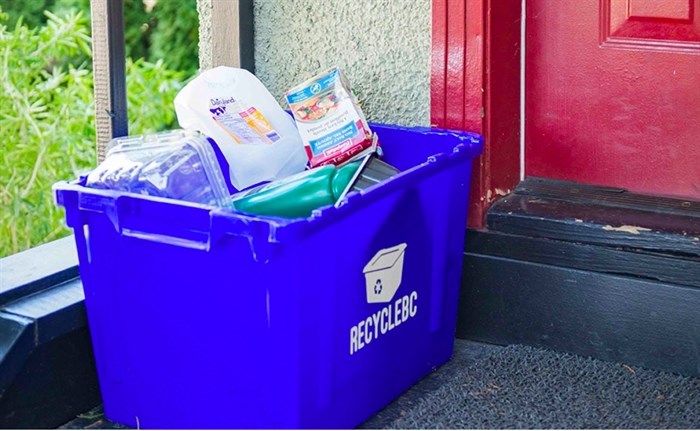
Image Credit: Submitted/RecycleBC.ca
August 30, 2020 - 7:00 AM
B.C. has set up a recycling system that is totally funded by businesses whose packaging you toss in your recycling bin on a regular basis.
It’s a system that’s not only unique in North America but is the envy of countries around the world, according to David Lefebvre, director of public affairs west for Recycle B.C.
“We have the largest basket of accepted materials and we do an excellent job in managing those materials responsibly to the end of life,” he told iNFOnews.ca. “British Columbia is studied around the world for the system that has been created to manage packaging and paper products by Recycle B.C.”
But it doesn’t come cheap.
All business that produce or distribute or, sometimes, even sell packaged products in B.C. have to pay fees to Recycle B.C. if they have $1 million or more in annual revenues and produce more than 1,000 kilograms a year or more of packaging material that goes into homes.
In 2019, that cost them $98.4 million, up $13.5 million from 2018.
The program was initiated roughly six years ago, after the B.C. government put in regulations requiring businesses to manage their packaging. They set up Multi-Material B.C. to carry out those rules. That has since been renamed Recycle B.C.
Recycle B.C. pays municipalities a fee to collect recyclables from homes. Those are then delivered to their depots. Only 16 communities chose to have the collection done by Recycle B.C. instead.
It has created a standard “basket” of items that can be recycled throughout the province and manages what happens to those materials. Only about seven per cent of what goes into recycling containers ends up in landfills, Lefebvre said.
All of B.C.’s glass is processed in the province, as is almost 99 per cent of its plastic. Metal is processed in Canada and the U.S. and, as of this spring, the majority of the fibre is being managed in the Pacific Northwest.
Having so much of the material being processed domestically or, at least, in North America, shielded B.C. from the huge cost increases that hit the recycling industry in 2018 when China stopped taking the vast majority of the world’s recyclable materials. For some jurisdictions, that meant a tripling of costs.
Still, B.C.'s costs have gone up for all products this year.
There are five categories of materials where fees are charged.
Printed Paper, like newsprint, magazines and phone books, is one category. Newsprint has its own contract but the others pay 26 cents per kilogram this year, up from 14 cents last year and 11 cents the two previous years. In 2016, however, the fee was 24 cents.
Lefebvre says China’s actions were a key factor in the price increases but there are many others, ranging from the volumes of material being recycled to the selling price of the end product.
Recycle B.C. is in the process of setting its fees for 2021. Those will be announced in the fall. Lefebvre could not speculate on whether they will go up or down.
Another classification is paper packaging that includes things like corrugated cardboard and boxboard that’s charged 36 cents a kilogram while paper laminates and aseptic containers are charged 83 cents.
Last year, 83 per cent of B.C.'s paper was recycled. That’s the only category where the recycling rate fell. In 2018, 86 per cent was recovered.
There are six different types of plastics that can be recycled, from something called PET and HDPE containers that are charged 77 cents a kilogram to plastic laminates at $1.41, double what it was in 2016.
B.C. is the only jurisdiction that successfully recycles products with multiple types of plastic in them, such as a deli meat bag with a zipper on it.
Plastic is the product that’s recycled the least. Only 22 per cent of flexible plastic is recycled while rigid plastic was at 56 per cent. Still, those are improvements over 2018.
Fees are also paid for various types of steel (36 cents), aluminum (56 cents) and glass (17 cents).
Glass is the product that’s recycled the most at 87 per cent while 73 per cent of metal is recycled.
See the fee schedules here.
See Recycle B.C.’s 2019 Annual Report here.
To contact a reporter for this story, email Rob Munro or call 250-808-0143 or email the editor. You can also submit photos, videos or news tips to the newsroom and be entered to win a monthly prize draw.
We welcome your comments and opinions on our stories but play nice. We won't censor or delete comments unless they contain off-topic statements or links, unnecessary vulgarity, false facts, spam or obviously fake profiles. If you have any concerns about what you see in comments, email the editor in the link above.
News from © iNFOnews, 2020